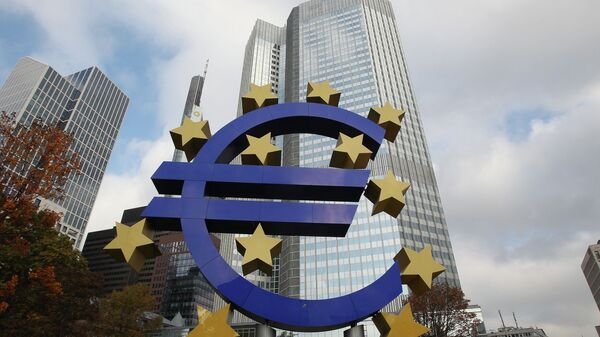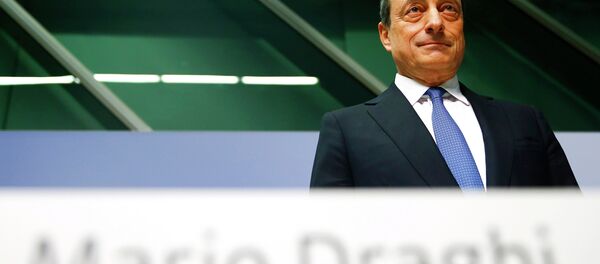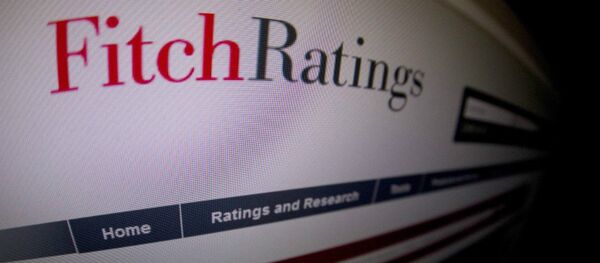“While QE will provide some breathing space, it is important that the regional and national authorities make greater efforts to make and sustain the necessary structural reforms (especially in nations such as France and the periphery) or boost infrastructure investment (in for example Germany),” Robert Dobson, director and senior economist with Markit Economics told Sputnik. “If progress in these areas drifts then the opportunity may be wasted.”
On Thursday, the ECB’s chief Mario Draghi announced the 60 billion euros ($67 billion) a month quantitative easing program. The program, which is set to start this March and end in September, will see 1.1 trillion euros worth of government and corporate bonds bought by the EBC.
“QE can help the euro area by keeping market interest rates low, thus boosting businesses and consumers, and stave off some of the worst fears about deflation becoming more firmly set in the region. However, QE cannot fix the underlying structural and competitiveness issues that prevail in the euro area,” Dobson stressed.
Alasdair Cavalla, an economist with the Centre for Economics and Business Research, also stressed that pumping more money into the Eurozone should be accompanied by additional fiscal stimulus to be successful.
“The program won’t enough on its own and stimulate a lot of demand in the Eurozone. We think that the channels that QE works through have been moderately [successful] in the US and in the UK and had a mid-success in Japan,” Cavalla said, adding that these channels are likely to be less effective in the Eurozone due to structural issues. “Our broad view is that there is some type of fiscal stimulus needed as well and hopefully some structural reforms too.”
At the same time, Nick Kounis, the head of macro and financial markets research at ABN AMRO, believes that the QE has already started to help the Eurozone as the markets anticipated Draghi’s announcement.
“I think it will certainly help. It is much bigger than expected. I think it is already leading to easing the financial conditions. And I think that it will lift growth and inflation,” Kounis told Sputnik adding that QE, however, is not a miracle cure. “I think that we’ve seen quite a lot happening in the run-up to the QE announcement – the euro has already fallen quite sharply over the last few months, partly in anticipation of the QE.”
Robert Dobson also stressed that the European authorities’ hands “were largely tied for alternative measures,” as “interest rates are already near-zero and austerity rules out additional spending by the national governments.”
Nick Kounis pointed out that the declining oil prices are also helping economic growth. So that over the next few months, the economist concluded, we are likely to see an upward trend in business confidence.
Draghi’s bond-buying “bazooka” came through despite Germany’s spearheaded resistance to the QE. Prior to Drahi’s press conference on Thursday, German Chancellor Angela Merkel warned that regardless of what decision the ECB takes, the European politicians “should not become diverted from the fact that we … need to put a framework for recovery in place.”
“Germany is still fairly hostile to the program and it is the reflection of German public opinion. From their point of view they are being made to pay for other countries. But on the other hand, the Eurozone is much bigger than just Germany,” Cavalla said.
“Germany will however remain watchful that the other nations continue to follow structural reform and move towards more balanced government spending programs,” Dobson predicted.
On Thursday, as the ECB’s announced the QE in Frankfurt, Mitch Feierstein, a hedge-fund manager and chief executive of the Glacier Environmental Fund Limited, described the ECB decision on QE as a “Ponzi scheme akin to Monetary Heroin."
"Simply stated, the ECB’s QE is a back door banking bailout that transfers risks to the balance sheet of EU Taxpayers," Feierstein told Sputnik news agency on Thursday.
Feierstein compared the injection of money into the Eurozone’s ailing economy to the branding of heroin as a "safe, non-addictive" substitute for morphine by Bayer at the turn of the twentieth century. Even though Bayer terminated its global sales of heroin in 1913, once the company had realized the unintended consequences of its use, the drug was not withdrawn or made illegal in the US until 1924.





